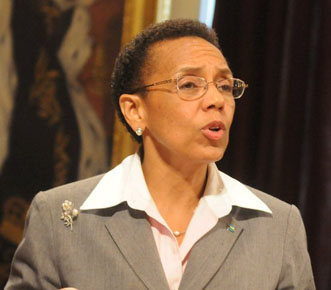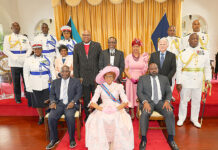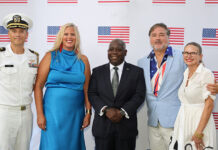
Speaking Notes By
Sen. The Hon. Allyson Maynard Gibson
Attorney General And Minister Of Legal Affairs
Made In The Senate
On The Majority Rule Public Holiday Bill 2013
15 May, 2013
This Bill will provide annually a day to be set aside to tell our stories, remind our people who we are and acknowledge our heritage. That Day, Majority Rule Day, will be a national holiday.
Like the Randol Fawkes Labour Day, making January 10th a national holiday to celebrate Majority Rule is the right thing to do.
The timing is right – last year was the 50th Anniversary of the Suffragette Movement and this year the 40th Anniversary of Independence.
Sir Arthur Foulkes, the Governor General, has said that Majority Rule Day this is the most important day since the abolition of slavery in the Colony of The Bahamas on August 1st, 1834
The annual celebration of this day is the opportunity to become “One Bahamas”.
So long as the majority are afraid to tell their stories and celebrate their rich history for fear of being accused of stirring up racial hatred or racism, we can never be “One Bahamas”.
These stories are the thread that holds together and that is woven into the pieces of the rich tapestry that is The Bahamas.
The Old Testament is replete with examples of the command which marks the Passover, the tale of a Chosen People, – “tell your children and your children’s children”. In no small measure I believe that failure to tell our history to the children is why we have so many social problems today. Our children do not place themselves as a part of a rich and noble heritage. We must ensure that they understand that they are carrying the baton to the next generation. It is their responsibility not to drop the baton. It is our responsibility to support them in running their leg of the race.
The names of the victorious PLP candidates of the General of Election of 1967 were: Lynden Pindling, Leader, Preston Albury, Clarence Bain, Milo Bulter, Clifford Darling, Elwood Donaldson, Arthur Foulkes, Carlton Francis, Arthur Hanna, Warren Levarity, Curtis MacMillan, Uriah McPhee, Maurice Moore, Edmund Moxey, Jimmy Shepherd, George Thompson, Jeffrey Thompson and Cecil Wallace Whitfield.
Randol Fawkes – Independent and Alvin Braynen – Independent cast their vote with the PLP to enable the PLP to become the Government.
These are the people that we usually remember together with the first Cabinet.
Majority Rule is at its essence the struggle by people for equality, dignity and respect.
Stephen Dillett, born in Haiti, was the first man of colour to be elected to the House of Assembly. From that time up until the 1950s there was only a handful of representatives of African descent in the House of Assembly. Numbered among the early pioneers were James Carmichael Smith, William Parliament Adderley, Etienne Dupuch, A. F. Adderley, Milo B. Butler, Thaddeus A. Toote, S. C. McPherson, Gerald Cash, Bert Cambridge, Claudius Walker, L. W. Young, Maxwell Thompson, H. M. Taylor, Cyril Stevenson and William Cartwright.
Their lives exemplify “Believe in Bahamians”. Or, “Yes, we can do anything”.
It didn’t start there.
We mustn’t forget:
· Pompey
· Poor Black Kate
· The Abolitionists
· Rev. Dr. HW Brown
· Rev Dr. Reuben Cooper
· Sir Sidney Poitier
· Miss Lillian Coakley
· Sam and Nellie Williams
· Captain Fernley Palmer
· People like Sir Clifford Darling from Acklins, Sir Albert Miller from Long Island and so many other Family Islanders
The people in Rosemary Hanna’s Book, “Pictorial History and Memories of Nassau’s Over- the- Hill” are the quiet heroes of Majority Rule. Not one of them was born to a life of privilege. Daily they worked hard so that our lives could be better. They by their lives taught us about hard work, discipline and sacrifice and to get a good education.
I hope that someone writes a similar one about the “Out East” or “the Pond” community.
We must also write about the Kellys, Pinders, Pyfroms and other families typically associated with the minority.
The truth is complex. It is not simple.
Their stories have brought us to today.
These are the stories of who we are.
The majority of our ancestors did struggle and risk their lives for us to be where we are today.
It is in telling their stories and forgiving the hurt and pain – like Nelson Mandela did and as advocated by Archbishop Desmond Tutu that we will achieve reconciliation.
The “politicians” such as Lincoln or Sir Lynden are the “face” of the successes.
There are thousands behind them who are the heroes of the Quiet Revolution. Their stories are those that will inspire our young people.
The Suffragettes must be remembered – Mary Ingraham, Eugenia Lockhart, Georgiana Symonette, Mable Walker, Bertha Isaacs and Doris Johnson.
We must also remember the many people not born in The Bahamas – teachers, nurses, policemen, doctors, contractors from abroad who have enriched our tapestry – examples are June Stevenson, Beryl Hanna and Zoe Maynard – we need to avoid xenophobia.
Annually, as well as telling stories – it’s a time for introspection, reflection on past and planning for future.
Nicolette Bethell said “You see, it’s often easier to fight one’s enemies when they’re obvious. When the person who is defining you as a piece of property is also the same one who is feeding you and clothing you, from whose very hands you might accept the gifts, and beside whom you might work, day in, day out, it becomes very difficult to separate the kindness of the individual person from the fundamental injustice of the system. When the person who is keeping you in your “place” is also the one who offers you assistance, and whom you might like and respect and even emulate, it becomes almost impossible to seek freedom. The comfort brought by the relationship you have is often too much to put at risk. Perhaps that’s why we Bahamians today are so uncomfortable with remembering that we were once slaves. Perhaps it has something to do with the fact that our freedom is only half-here; for we are still quick to surrender our identities and our sovereignty for a taste of the comfort offered to us by the masters of today. There’s nothing new for us to be asked weigh the tough realities of forging our own way against the ease offered us by people who come in from abroad, smiling and handing us treasures we don’t truly understand. Old habits are hard to break, after all, and it’s happened to us before. The Lucayans lost their islands, and their culture; the slaves and their descendants got material assistance in the place of freedom. Why should we be any different?”
Today, 2013 too many of our children define themselves as property. They speak of “transactional sex”. That means that they sell themselves to get what they want. “it’s just a transaction”. This is not the example that our forefathers and mothers gave us.
This debate today is about the future. It is a landmark moment in our history.
As Sir Arthur said, “So even as we celebrate Majority Rule…let us be worthy of their example of unceasing struggle; let us not give in to cynicism and apathy; let us not be seduced by those who refuse to join the long march for freedom because they disdain the untidiness of the process.”
Each of us in the Senate has the honour of carrying on that ancient and honourable process – democracy in action. As we do so we everyday celebrate by our example what is to be a Bahamian in the best little country in the world.
To God be the Glory!







